|
|
Chapter Ten: Legal Trouble (1982)

The 1982 American Music Awards took place on January 25. The event was held in Los Angeles and Air Supply was nominated in the Favorite Pop/Rock Band, Duo, or Group category. Air Supply, who were in Australia at the time, performed ‘Sweet Dreams’ beside the Sydney Harbour Bridge, which was broadcast via satellite back to L.A.. “It was in the daytime, which was rather unusual because we were going live to the U.S.,” recalls Russell. “We did the song and then we were seated on these two stools as we were nominated for an award. Just as we won the award, and were about to reply, they lost the feed. So we couldn’t even accept the congratulations or anything.” Air Supply beat out AC/DC, the Pointer Sisters and REO Speedwagon, and took home their first AMA. The award is still a sore spot among AC/DC fans. In an interesting twist, Russell cites AC/DC as his second favorite band of all time, after the Beatles.
In 1981, Lance Reynolds and Fred Bestall were approached by film producer Andrew Gatty to secure a song from Air Supply for a movie soundtrack. Gatty was working on an Australian musical comedy called The Return of Captain Invincible, which was to be filmed in Sydney. The film had an estimated budget of $5 million, with parts of New York re-created inside a massive hanger. Reynolds and Bestall negotiated for Air Supply to record ten songs for the movie soundtrack after Gatty handed them responsibility for music content of the entire film. But, The Return of Captain Invincible was delayed until 1983, and Air Supply was dropped from the project because their relationship with the managers soured.
Air Supply and the Little River Band were to record music for another Australian movie called The Pirate Movie, for which filming began in September, 1981. The film had secured a world-wide distribution deal with Twentieth-Century Fox, which guaranteed that at least $3 million would be spent on promotion. The deal was an important step for the Australian film industry, because it was the first time a major distributor had promised to promote an Australian film before seeing the finished product. The Pirate Movie, which featured American actors Christopher Atkins and Kristy McNichol, was released in 1982, and was a commercial flop. The movie did not include music from Air Supply or the Little River Band, choosing instead to use music from Kool & The Gang, The Peter Cupples Band, and the film’s cast.
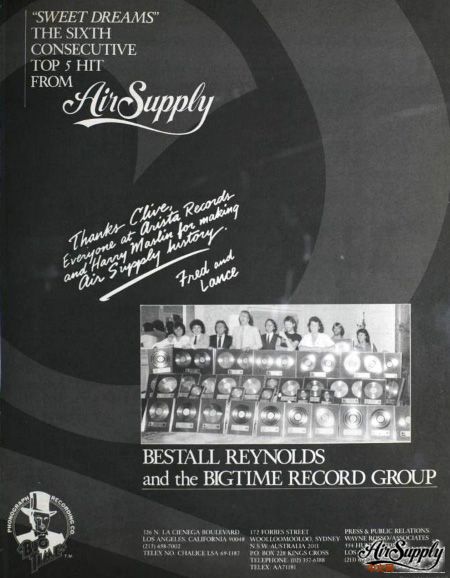
Billboard Ad - March 20, 1982
By early 1982, it was no secret that Air Supply was not happy with the existing contract with Big Time. The contract gave Bestall & Reynolds 60% of all sums earned by Air Supply’s recordings, while a publishing pact with Graham paid him only 70% of the gross receipts from his compositions. Graham believed that his publishing pacts with Bestall & Reynolds would leave him with the copyrights and grand rights to his music, which was apparently not the case.
The relationship between Air Supply and Bestall & Reynolds deteriorated after the managers fired the group’s tour manager, Henry Neuman, for what they claimed was Neuman’s inability to account for certain funds. Additionally, Bestall & Reynolds believed that Neuman had “undue influence” over the band thanks to his close personal relationship with Graham. Communication between Air Supply and their management team suddenly stopped as the band tried to distance themselves from their contracts with Bestall & Reynolds.
On March 4, Bestall & Reynolds sued Air Supply in an Australian court for breach of contract, as they tried to recover $400,000 in advances made to the band. A second suit asked the court to clarify rights from clauses in a 1981 contract. A third suit sought validation of the 1978 recording agreement Air Supply members signed with Big Time Phonograph Records.
On March 17, Air Supply filed a $35 million suit against Bestall & Reynolds and Careers Music in a Superior Court in Los Angeles. The suit charged the managers with breach of fiduciary duty, fraudulent representation, breach of contract, promissory fraud, conversion and breach of convenant. Air Supply alleged that the managers discouraged them from acquiring outside legal advice before signing with Big Time, and that the band members were naive in 1978. The suit also claimed that Bestall & Reynolds received $500,000 in advances from Arista and a similar sum from Careers which had not been accounted for or paid to the group. Up to $3 million may have been involved in this regard. Air Supply also claimed that Bestall & Reynolds converted musical equipment and stage props belonging to the group. A second suit was brought forward by former band member, Criston Barker, asking for $330,000 from the managers claiming the contract with Big Time was “harsh and unconscionable.” Lance Reynolds described the Air Supply suit as “clearly a sensational move on the part of the [group’s] attorneys here” in view of the prior Australian lawsuit, which Reynolds insisted would “uphold and prove valid” the band’s contracts. Reynolds’ Los Angeles attorney thought the suit as “born out of outright greed, rampant ingratitude and a desire to evade perfectly valid contracts.”
“It’s real hard when you are the artist, because I always figure that we are the people that generate the whole thing,” said Russell. “Without the act or the music, there can’t be a manager, an agent, a video, a record or anything. So you feel that much more strongly about the whole thing, and you want to ensure that justice is served. It’s hard to deal with something like this, because you really feel like your heart and soul are being removed.”
“It makes you angry,” said Graham, “because if you feel that someone does not deserve a piece and you say, ‘No, they are not getting it,’ then it just goes on and on. Finally, you have to ask yourself, is it worth all this antagonism when I should be getting on with my career.”
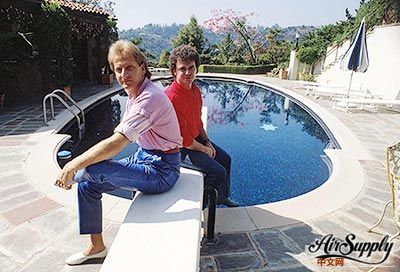
In April, Air Supply signed a worldwide management deal with the most infamous manager in the history of rock music - Don Arden. In England, where Arden had lead bands like the Small Faces, the Animals, Black Sabbath and ELO into stardom, he was called ‘the Al Capone of rock.’ Arden was short in stature, but tall in power. He started his own music label, Jet Records, while living in England, and opened an office in the States in 1972. He had a terrific track record musically, but he was best known for his questionable business methods. These alleged methods included beatings and the deployment of muscular assistants with firearms.
Graham and Russell first heard from Don Arden when they were in Singapore, the first stop in a six week tour of Southeast Asia. Arden phoned them directly from his home in Los Angeles to ask if he could manage the band. Russell knew a little of Arden’s controversial past, but he figured that since Arden had turned ELO into stars, he could do the same for Graham and himself. Arden flew into Singapore the very next day with a business proposal in hand. They met in Arden’s hotel room, the presidential suite at the Mandarin. Air Supply was shocked, and extremely impressed, that someone of Arden’s stature in the music business would fly halfway across the world to meet with them on such short notice. Arden told them; “You’re going to hear a lot of things about me, that I’m some kind of gangster. I’d say about ten percent of it is true. But I’ll take care you you. Come with me, boys, I’ll make you superstars.”
Air Supply hoped that Arden could get them out of their existing management contract, and into a more lucrative deal with Jet Management. Arden had freed-up many bands in the past, often through intimidation, threats of violence or a lump-sum payment. Sometimes all three. “Air Supply were one of those successful but largely faceless rock acts that dominated mainstream radio in the U.S. in the early eighties,” said Arden in his 2004 autobiography titled Mr Big. “With a wonderful blend of top musicianship and catchy generic rock tunes, Air Supply were easy on the ear and very popular - but not the sort of group who were written about much in the press. Because of that they never made it in Britain or Europe, but in America they were gold dust for about five years.”
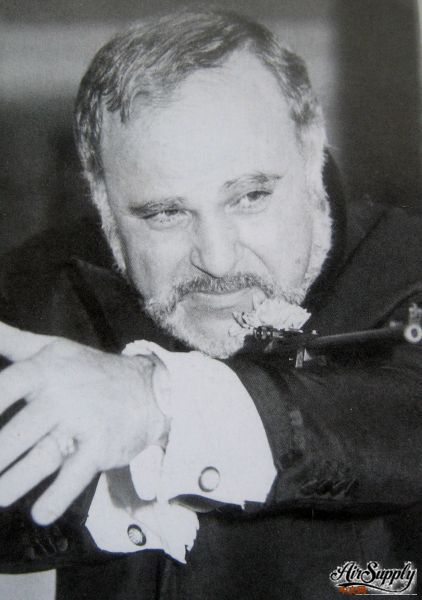
Don Arden
The attorney for Bestall & Reynolds contended that Air Supply remained under contract to his clients until the suit that firm brought against the band was resolved. “They have no right to enter into a conflicting management agreement with anyone until the issue is adjudicated,” said the attorney. The situation obviously angered Bestall & Reynolds, who must have been concerned when they learned that Arden once had his henchmen dangle a competing manager (Robert Stigwood) out a twentieth-floor window for trying to steal one of his bands.
Arden wrote about the ‘window incident’ in his autobiography; “Contrary to legend, it wasn’t on the twentieth floor, or anything like it. Stigwood’s office was actually on the fourth floor. We walked in unannounced, my guys and I, and everybody just froze. Then, just as we had rehearsed it, a couple of guys locked the front door and took over the phones. I told everybody to stay calm and remain seated and said that we would be gone in a few minutes. Nobody moved. Then I walked into Stigwood’s office, followed by this triangle of guys, and just stood before him, looking down my nose at him. He began trembling. ‘Don,’ he said, ‘what a pleasant surprise.’ ‘Cut the Sh_t,’ I said. ‘You know why I’m here.’ ‘Is it about the Faces?’ I didn’t even bother to answer. I just looked at him and said, ‘You know, you really shouldn’t do things like that. That isn’t showbiz, that’s just bullsh_t. You should go out and find your own act, and build them, like I have done. Not try to steal them from other people - and especially not from me.’ He was squirming by now. ‘No Don,’ he said. ‘absolutely not!’ ‘Because if you do,’ I said, pausing for dramatic effect, ‘this is what’s going to happen.’ I lifted him out of his chair and dragged him over to the balcony. He was crying, ‘No Don!’ I stuck his head over the edge of the balcony rail and said, ‘You see that f_cking street down there? Well, that’s where you’re going the next time you f_ck with me!’ At which point I was going to give a couple of digs maybe and leave it at that. Job done. What I didn’t know, however, was that my guys had decided to play a little gag on me and rehearsed an extra little scene of their own. Just as I finished my little speech, one of them shouted, ‘Let’s sling him now!’ And they all rushed forward and took Stigwood out of my hands and lifted him up above their heads. Then they carried him right to the edge of the balcony and made as if to throw him off. Stigwood must have gone into shock because his body went completely limp. It was as if he’d died. We left him there on the floor, not even moving. He never bothered me again.”

New York City - 1982
Arguably, without Lance Reynolds and Fred Bestall, Air Supply would not have been successful in America. The managers orchestrated the Rod Stewart tours, and when Air Supply needed it most, having been dropped by CBS, they signed them to their label, Big Time. Without the record deal, the aptly named ‘Life Support’ album might not have been recorded, and Robie Porter would never have had the opportunity to shop ‘Lost In Love’ to labels in America. Regardless, now a deep bitterness developed between Air Supply and the managers.
“You have to look at the person we’re talking about’s past record,” said Lance. “We made a few inquiries around the record industry and we realized who we were dealing with. Let’s just say we couldn’t believe what was going on. We didn’t even know there was a problem until the guys in the group wouldn’t return our calls. This whole thing was very slyly done. Now they’ve gone on TV calling us shady characters.” Lance talked about the situation in a 1985 interview for the Sydney Herald. “I’ve really only recovered in the last six months, and this is the first time I’ve talked about it publicly. What it did was to destroy my faith in human nature. I’m not nearly as trusting. Fred and I lived and worked for those guys for seven years, and then suddenly they denied our existence. What hurts the most is that we thought we had been working with a bunch of guys who had heart and integrity. But I guess that’s just not the case.”
Rumours of bands splitting from management swept the music industry like wildfire in 1982: Billy Gaff and Rod Stewart, AC/DC and Ted Nugent, John Reid and Elton John, Derek Sutton and Styx and of coarse Bestall Reynolds and Air Supply. Brandon Phillips, president of Management West International, felt that some managers were treated unfairly. “As a manager I may be biased, but I am not naive,” he said. “In at least one of the above cases, now working its way through the courts, no apology need be given for the contribution of management, whose efforts in building a superstar act at least match that of the group itself or its record label. Where were all those so-called advisors and lawyers when the artist was starving and unknown? Shame on the lawyers who are quick to pick up the cause of an artist who can pay his bill, but are nowhere to be found early on when their advice is really needed.”

Don Arden's Pool
Don Arden took Air Supply under his wing and treated them like family. He referred to them as his ‘boys,’ and hosted Graham and Russell at his Hollywood mansion, even giving them access to the two guesthouses on his property. Many of Arden’s own business associates were escorted into his mansion like it was the secret hiding spot of America’s most wanted. “When I went to visit Don at his beautiful home in Hollywood,” said one business associate, “it was like something out of a Clint Eastwood movie. I was frisked, my family was frisked. Don just loved it. He loved this image of being the Godfather.” Arden had close friends in the Mafia, a fact he never tried to hide. The Mafia was instrumental in helping Arden reduce the number of pirates selling unofficial Air Supply merchandise outside concert venues.
“In 1977, I bought my dream house,” said Arden. “Actually, I don’t think even my dreams ever stretched quite as far as something like this. It was actually the house that Howard Hughes had designed and built for himself back in the forties. This wasn’t just another Hollywood mansion: is was a self-contained world. I bought it from Charles Boyer, the French actor. Altogether, I paid $7 million for about eight acres of land and all the fabulous property Hughes had built on it. I then spent another $3 million renovating it. Of course, it caused a lot of envy among certain people. And I was always giving parties there for the people who worked for us: the staff at Jet and CBS - not just the heads, either, but the secretaries too, everybody, right down to the guys who ran the warehouses and pressing plants. I wanted them all to feel important and appreciated.”
Arden was managing the solo career of Ozzy Osbourne, and in 1982, Ozzy married Arden’s daughter Sharon. Sharon was active in the music business, and as a wedding present, Arden gave her the Ozzy Osbourne management contract. The relationship between Arden and Sharon eventually soured after Sharon broke Osbourne’s recording contract with Jet Records and signed with another label. “Don Arden loved the power and he loved the fear that it put into people,” said Sharon. “I swear, after he saw The Godfather, it sent him bonkers. He thought he was the godfather. And he lived his life like that. He was a street fighter: he was brought up on the street, he had to fight for everything, and he’d had very little education. All of that I get. But he was a bad businessman and he came from the mentality of ‘You f_ck me, I’ll f_ck you twice.’ Instead of going to the lawyer or going to the police, he’d always deal with it himself in his own way.”
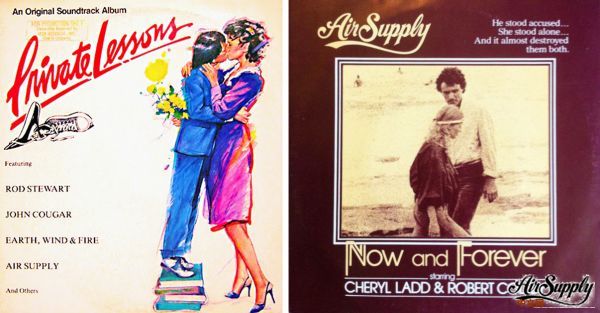
Private Lessons OST 'Now and Forever'
While the legal disputes filtered through the courts, Air Supply returned to the studio to complete their next album. It was recorded in Sydney, with Harry Maslin returning as producer and engineer. The studio location was ideal for Russell because he was living with his wife and son in a spacious apartment in Sydney. Graham still lived on the Central Coast on a ranch in Avoca Beach, just an hour drive North of Sydney. He had recently bought a farm in Ourimbah, a small township and a suburb of the Central Coast. One of the tracks that stood out in the studio, and the last song added to the fourthcoming album, was ‘Now and Forever.’ Graham wrote the song for an independent Australian movie featuring Cheryl Ladd and Robert Coleby. Russell and Graham met Cheryl Ladd at a racquetball club in Sydney during a break in filming, and she asked if they would record a song for the movie. Graham went home and finished the song that night. It was used as the title track for the 1983 movie called Now and Forever.
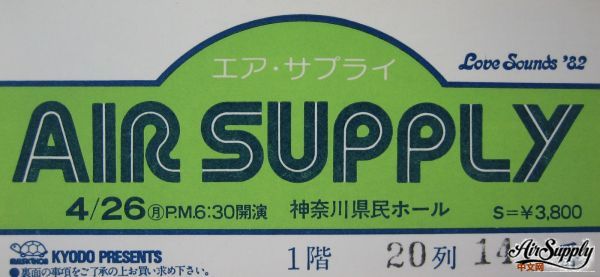
Yokohama, Japan - April 26, 1982
In the spring of 1982, Air Supply completed a six week tour of Southeast Asia. They played 25 shows in seven different countries, with all dates sold out far in advance. The tour began in Singapore (where they first met Don Arden) then continued to Malaysia, Hong Kong, Thailand, the Philippines, Japan and Korea. Air Supply had performed in Japan previously, but this was the band’s first tour of the Asian continent. They played 13 concerts in Japan, where their popularity rivaled that of any band, past or present.
Air Supply’s popularity in Japan was not simply the result of their success in North America. A hit on the Billboard charts did not mean it automatically appeared on the Japanese charts. International artists had to be processed for the Japanese market if they wished to increase sales. “Overseas record firms and artist management understand this point,” said Nobuya Ito, the president of Nippon Phonogram. “Artists built up in Japan like Air Supply can sell several hundred thousand copies of LPs, just as in the case of Japanese artists. This is an interesting development in the last two or three years. For Air Supply we designed an original album jacket appropriate for the Japanese market, and we changed the jacket design partway through the sales campaign. We took detailed care of the album. Before Air Supply even appeared on the charts, we saw its future possibilities and brought it to Japan on a promotion tour with Phonogram footing 100% of the cost. The big investment brought about major results.”
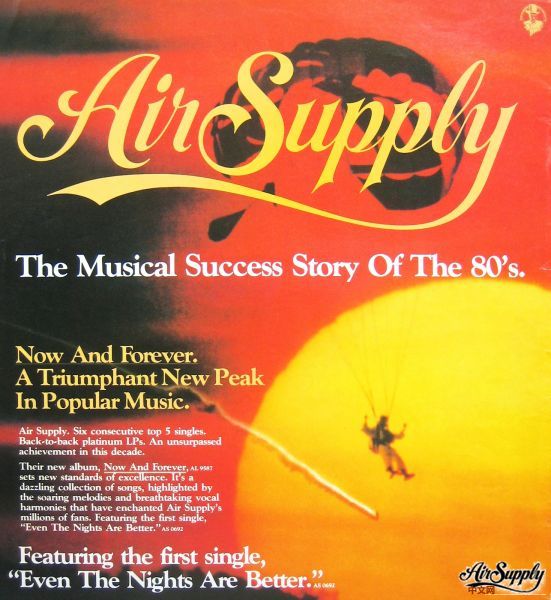
Arista released the lead single, ‘Even The Nights Are Better,’ on May 19th. The album, ‘Now And Forever,’ was shipped gold a week later. ‘Even The Nights Are Better’ was another of Clive’s suggestions, and there was much hesitation from Graham and Russell to even record it. Russell thought it sounded too much like ‘Arthur’s Theme’ by Christopher Cross. “We were in the studio in Australia with our producer Harry Maslin,” said Graham, “and for some reason they wanted me to sing this song. On a lot of the older hits I would start off and Russell would come in, and I think they wanted to keep that formula. But it just didn’t sound right. Russell tried it and sang it first or second take, and it was great.”
Within a few weeks, ‘Even The Nights Are Better’ hit #5 on Billboard. This was the seventh straight single to reach the Top 5 on the most important music chart in the world, something that had only been done by the Beatles. ‘Even The Nights Are Better’ was an international hit, and it told the world that Air Supply was back. In Australia, the song reached #35, another disappoint in Air Supply’s homeland. ‘Now And Forever’ album achieved platinum status in the U.S. (1 million units) and Canada (100,000 units) in early 1983, the third straight album to do so. ‘Now And Forever’s’ success was much needed for Arista, because the record label had no other albums reach platinum in 1982.
Air Supply promised fans and media that ‘Now And Forever’ would have a new sound. It would retain the basic emphasis on melody, but would also be more adventurous. “We’ll get a little spacey with the melody and harmony,” said Graham. “There will always be singles, but it will be nice to have a couple of songs radio is not so eager to play, songs that will appeal to left-wing listeners.” But music critics were disappointed because the album was filled with the same old sound. It was sure to satisfy Air Supply fans, but offered nothing new. From the record labels perspective, there was no reason to alter a successful formula that had sold millions of albums, and critics responded accordingly:
The album, despite having material written by outsiders, is somehow too much in the Air Supply mold. First Graham sings in his low voice, and in the chorus or second verse, Russell breaks in with his voice that is so high that Italian macho opera singers are put to shame. ‘Now and Forever’ is not an achievement. It is merely a continuation of a tried-and-true formula that is getting stale. - New Straits Times, Malaysia
The tracks on this album are vintage Air Supply with innumerable love songs and the old ‘I was lost till I found you and now life is wonderful’ type numbers. One thankful change from all the saccharine and mush is a really nice number called ‘Don’t Be Afraid.’ This one single song takes a moment to highlight the superb sounds of the two lead singers wearing their best harmony suits, and makes a welcome respite. All credit to Air Supply for its success where so many before have failed, but somehow I don’t think this one will be atop the collection in many living rooms. - Lisa Perry, The Canberra Times, Australia
North American radio programmers were concerned with the lack of variety in Air Supply’s music, which might explain why ‘Even The Nights Are Better’ dropped from #6 to #42 on the Billboard Hot 100 in just one week. It was one of the quickest descents in the history of the Billboard Hot 100. Dave Anthony, program director of KZZP-FM radio in Phoenix, had skyrocketed his station from 3.0 to 5.8 overall market share, to become the top contemporary station in the market. He achieved these results by instilling a more upbeat rock sound designed for 18-34-year-olds. Rock artists such as Pat Benatar, Journey and Bob Seger were put into higher rotation. “Some artists we’re against,” says Anthony. “We don’t have one Barry Manilow song in there. I just don’t think that he’s a very relevant artist. I think Kenny Rogers will be there before long. Air Supply is headed in the same direction. They all seem to do the same song over and over.”
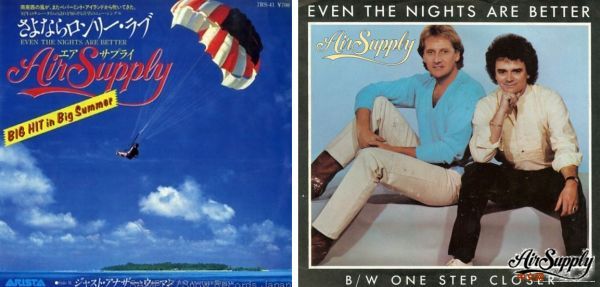
‘Even The Nights Are Better’ - Japan & U.S. 7" Singles
There was little time for the band to worry about what the critics were saying, because preparations were underway for an ambitious tour across North America. The tour was set to begin on June 15 at the World’s Fair in Knoxville, Tennessee, and finish in Hawaii on November 20. The new show featured flashy laser effects, and an elaborate set design that blew the bare bones tours of ’80 and ’81 out of the water. Plumbline Designs, who designed the Gothic castle used on Ozzy Osbourne’s tour, constructed a stage design for Air Supply that resembled a desert scene in Australia. The three-part stage set had sections that rotated to reveal members of the band. The simulated desert was made of 3,000 cubic feet of boulders, and a 500 square foot beige desert floor with monitor speakers hidden in the boulders. The boulders looked extremely heavy, but were light enough to be lifted by a single person. “What we gave Air Supply is a very realistic, scenic look as opposed to the slightly spacey, abstract look that all the other big acts have,” said Plumbline President, Simon Woodroffe. “It’s a rocky landscape that looks as if you’ve just stepped into the Australian desert.”
The Air Supply show featured a sound system imported from England which was designed to give clarity of sound without excessive volume. A lighting system of 250 lights controlled by a computerized dimmer, and a laser setup capable of projecting three-dimensional images and holograms were added. The tour required six large trucks to move the $150,000 set between cities, and 24 crew members to assemble the stage. Russell felt the band owed it to their fans to create a spectacular show. “The price of tickets these days is astronomical, out of this world, and it’s out of our control, so we decided to give people something to remember us by,” said Russell. “The set and the lighting just enhance the songs. They put people in a better position to listen to the songs also.”
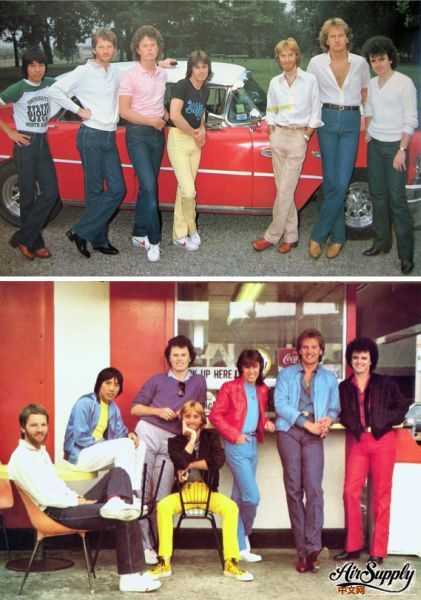
On June 11, Bestall & Reynolds shocked the music world with a huge cross-complaint suit against Air Supply in a Los Angeles Superior Court. The lawsuit was asking for $1.3 billion in punitive and exemplary damages, plus $100 million in special and general damages. They also threw in a $86 million claim for actual damages. The billion-plus suit was the largest in record industry history. Named in the action, in addition to Air Supply group members, was Arista Records and Arista’s Careers Music subsidiary, former Air Supply tour manager Henry Neuman, Careers Music chief Billy Meshel, two Air Supply-controlled music publishing companies, Studio Instrument Rentals and Don Arden. The lawsuit asserted that Air Supply’s recording pact with Big Time Records was still in force, with all options exercised, through March 31, 1986, that date established with the firming of a U.S. releasing arrangement through Arista Records.
The suit charged Don Arden with making “threats of grievous personal and bodily injury” and “improper activities.” In addition, Bestall & Reynolds charged him with “threatening to financially and professionally ruin individuals employed by the cross-complainants.” The former managers claimed that between late 1981 and early 1982, Arden told Air Supply he could secure a better deal for them and informed the group that they were being cheated by Bestall & Reynolds.
Bestall & Reynolds claimed that Arista, Neuman, Arden, Meshel and Careers Music induced Air Supply to breach its pacts by falsely representing that their agreements with Bestall & Reynolds were unfair and by offering them money, in the form of better financial terms, should they deal directly with them. In addition, the suit claimed that Arista informed Polygram Records, which released Air Supply’s records in Canada, that Bestall & Reynolds had engaged in fraud with respect to the band and that the group’s Big Time recording contract was not valid. To complicate matters, most of the law suits were filed in both Australian and American courts. Air Supply wanted to throw out the Australian suits because most of the litigants spent their time in the U.S. Bestall & Reynolds argued that most of the original contracts were signed in Australia, and that the courts down-under would hear the cases within a year, whereas they might take four to five years in the U.S.
“The situation is very simple,” said Reynolds. “We’ve had our band stolen away from us. In terms of what this band will make in the years to come, plus the seven years we put into building the group, [$1.3 billion] is not such an outrageous sum.” According to The Sydney Morning Herald, the legal battle carried on for two years and was settled out of court, mostly in the managers’ favour. Contrary to what was reported in the media, Lance Reynolds insists that he and his partner never got rich from managing Air Supply; “The cliches of the managers having houses and yachts have been repeated over the years in articles. To set the story straight, Fred Bestall bought a house with the financing from his wife back then. He rented a sailing boat, there was never any ‘yacht.’”
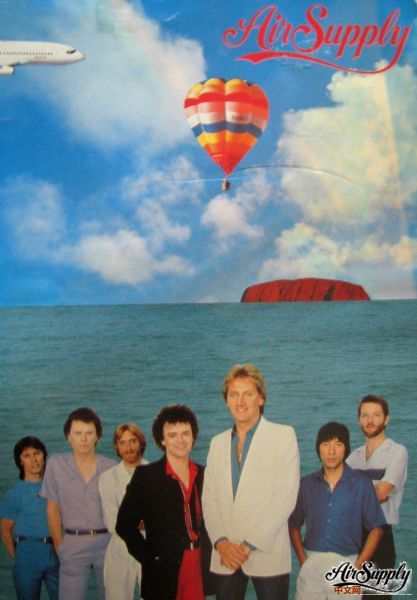
Japan Tour Book Apr 16 - May 1, 1982
On June 15th, Air Supply began their fifth U.S. tour with sold-out arenas, universities, and everything in between. They sold a variety of merchandise at concerts, including shirts, hats and their first tour book. They introduced a new stage show with numerous special effects. “It was quite a process to get to the place we’re at now,” said Russell. “We’re able to incorporate state-of-the-art lighting and sound systems, as well as sophisticated laser technology, but we are careful that the special effects don’t detract from the music or overshadow it.”
“The new stage effects were a challenge,” said Ed Auswack, President of Laser Media. “It involved a lot more creative thought to use the laser in a subtle way. One normally identifies the laser with hard rock and Star Wars type imagery, but we couldn’t do that with this group.”
The sheer size of the tour meant it was not feasible for Air Supply to perform in some countries. “We haven’t played in Australia for over two years,” said Graham. “If we play there we want it to be with the set and our whole crew. At the moment financially, we couldn’t do that, because with 26 or 27 people in the entourage [Australia] is so far away that we would lose money on it. We can’t afford to do that right now. Air Supply has always tried to involve the audience as much as possible. We don’t want people leaving our concert saying, ‘Wasn’t that a pretty light show?’ We want the fans to get their money’s worth on all fronts.”
The North American concert tour got mixed reviews from music critics:
Although the group gushed about being ‘Lost In Love’ and mushed about ‘Young Love,’ it never managed to work up any more passion than actors in a well-produced perfume commercial. While Russell Hitchcock’s pure voice hit all its notes and sustained them with ease, it often lacked genuine warmth. But at least Hitchcock moved a bit. The rest of the band stood stationary, as if suffering from robotic inertia. - Divina Infarino, The Milwaukee Journal
Amid a well-orchestrated light show, props that made it look as if the band was playing on a rocky hillside, and idyllic scenes projected onto a huge screen behind them, the group conjured up images of soft summer nights and turbulent affairs of the heart. Lead vocalists Graham Russell and Russell Hitchcock stole the show with perfectly balanced harmonies and between-song chatter. Hitchcock was in prime condition for the 90-minute performance. - Inge Langer, Ottawa Citizen
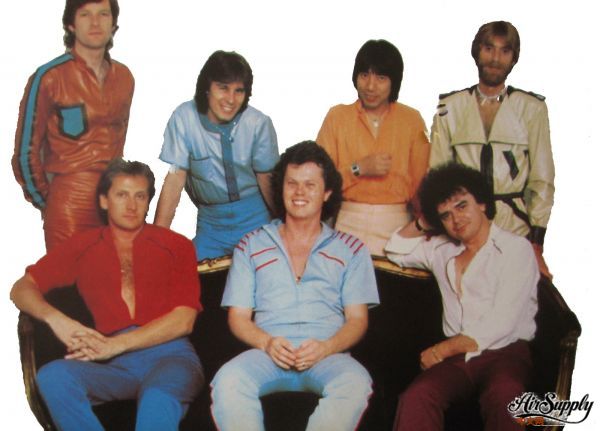
Australian soft-rockers Air Supply descended upon Radio City Music Hall [on July 22] amidst searing lights and spooky haze to open with their surprising hard-rock tune, ‘Can’t Get Excited.’ The high energy level held throughout the 90-minute show as the band ran through a mixed repertoire of their well-known hits, including ‘Lost In Love’ and ‘Every Woman In The World,’ and some beautiful cuts from their latest LP, ‘Now and Forever.’ Air Supply’s ability to really rock is impressive and surprising, as their albums seldom move from soft, melodic ballads. ‘Taking The Chance’ and ‘One Step Closer’ had the teenage sector of the sold-out crowd dancing in the aisles. Never neglecting the older audience, Russell Hitchcock and Graham Russell delivered consistently smooth harmonies on such mellow numbers as ‘Even The Nights Are Better’ and ‘All Out Of Love.’ Seeming as reluctant as the crowd to end the evening, the band returned after five minutes of cheering to tag on an appropriate encore with ‘Don’t Say The Morning’s Come’ (‘The One That You Love’). - Kim Freeman, Billboard
Regardless of what the critics were saying, Air Supply rode their wave of success. Musically, the band was in terrific shape. The current setup of seven musicians had been together for two years, and performed with professionalism on the road. Vocally, Russell was having some of his best concerts to date. “My voice is in better shape now than it has ever been,” said Russell. “In 1980, I really wore it out. We had to cancel the last couple of dates of the tour. I decided to approach singing different. I took it down into my chest a little more, instead of singing in my throat.”
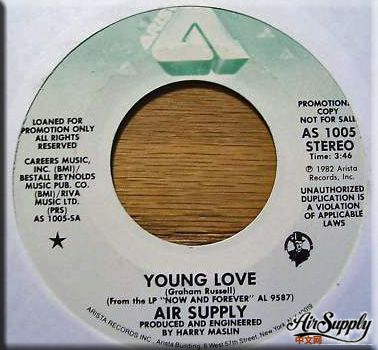
U.S. Pressing - Arista/Big Time
In September, Arista released the single, ‘Young Love.’ When Air Supply played it live for the first time it got a warm reception from fans. A promotional music video, shot in New York during a short break in the tour, showed Graham on piano for the first time. Graham was surprised that ‘Young Love’ was chosen as the next North American single. He preferred ‘Now and Forever,’ because he felt it was the strongest track on the album. “It hasn’t been marketed [in North America] as a single yet, but I’m sure it will,” he said. “I like the title cuts to mean something and this song really points out what we’re trying to do. We’d like to cement ourselves in people’s minds.” In May of 1983, Big Time Records released ‘Now and Forever’ as a single in Australia.
Billboard gave a mostly positive review of ‘Young Love,’ knowing that anything the band released was sure to be a hit with their loyal following:
With one of the duo’s gentlest vocal deliveries yet, this soft rock ballad caters to their younger listeners. Expect that hook to buttress their mainstream response while the song’s wistful lyricism should pull their usual strong adult contemporary reaction.
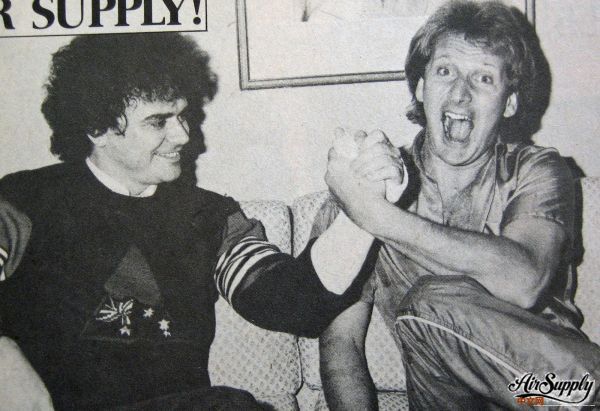
Russell With Cast After Breaking Wrist
Air Supply continued their lengthy tour throughout the States, but it almost ended prematurely when Russell fell from the stage at the Minnesota State Fair on August 30. About an hour into the show, Russell had walked on a narrow ledge between the audience and the speaker system, and he lost his footing trying to return to the main stage. He fell about seven feet onto a concrete apron. The band finished the song without him, but the show was stopped shortly after. Coincidentally, the accident occurred while Air Supply was performing the song ‘One Step Closer.’ Russell was taken to a local hospital and treated for a broken wrist, three broken ribs and several bruises. “We were all rocking out,” said Graham, “and Russell was out there doing his thing, and all of a sudden he was gone! So I thought, ‘Oh that’s cool, he’s probably gone for a drink or something.’ Then suddenly I saw the ambulance and all the people on the floor. He was on the concrete below. There was this picture of him in the paper the next morning. He was lying flat on his back, and it looked like he was dying. He broke his arm, but was lucky as he could have broken his head.” Russell played the following show in Denver, Colorado, on September 3, wearing a cast and sitting on a stool. He was in obvious discomfort on stage, and told the crowd, “How do I feel? I feel like a guy who fell off a 10-foot stage.”
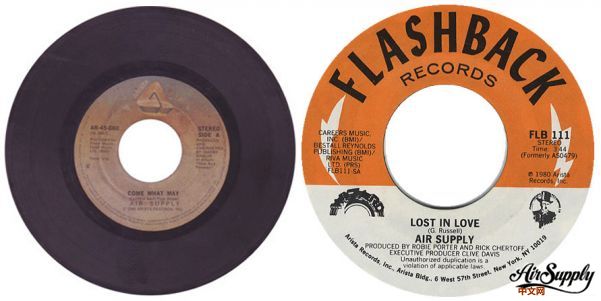
'Come What May' - 7" Philippines 'Lost In Love' 7"
‘Young Love’ ended the streak of Top 5 songs on Billboard, when it peaked at #38 in October. Cracking the Top 40 was still an accomplishment, but the song’s limited success signaled a change in the musical landscape. A third single, ‘Two Less Lonely People In The World,’ was released in November. Clive Davis had composers Ken Hirsch and Howard Greenfield shape the song specifically for Air Supply, and it took radio by storm, especially in South America and Asia. The song became the wedding anthem of the early 80s, despite reaching just #38 on Billboard and #46 on the Kent Music Report.
A fourth single, ‘Come What May,’ was released in some parts of Asia and Latin America. The song became very popular with fans in these regions, and had some success on local charts. The 7" single featured ‘Taking The Chance’ on the B-side. Russell felt that ‘Come What May’ was perhaps the strongest song on ‘Now And Forever,’ and was surprised it was not released on a wider scale: “This was another song that escaped recognition in North America, but was a big hit for us in Asia and in Latin America.”
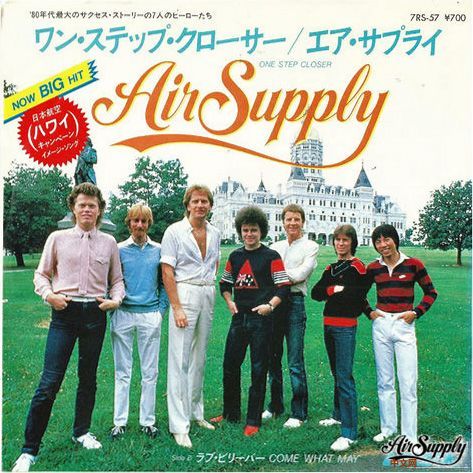
'One Step Closer' - Japan 7" Single
In Japan, the upbeat track titled ‘One Step Closer’ was released as a single. Surprisingly, given Air Supply’s significant popularity in Japan, the song failed to gain much attention on radio.
Legal troubles continued to pester Air Supply, when Big Secret Music, a California publisher, and Rare Blue Music, a U.K. publisher, brought litigation against the band in a Los Angeles court in November. The plaintiffs claimed that Graham Russell’s ‘Lost In Love’ infringed on their copyright of the song ‘Save Me,’ written by Guy Fletcher and Doug Flett. Named as defendants were Arista Records, B.R.M. Publishing, Arista Music, Big Time Phonograph Co. and Bestall/Reynolds Music. The suit sought a percentage of the profits and $1 million in punitive damages. The case took many years to filter through the courts, and was especially troublesome for Arista Records because they were required to calculate and disclose the net profits of ‘Lost In Love.’ This was a difficult and costly task, as Arista had to review hundreds of invoices and related data, complicated by the fact that ‘Lost In Love’ was released in the U.S. on two separate albums (‘Lost In Love’ LP and ‘Greatest Hits’ 1983 LP), as a single and as a ‘flash-back’ single. In addition, Arista had licensed several third parties in the U.S. the right to include ‘Lost In Love’ on various record compilation packages. To handle the workload, Arista hired close to 30 temporary employees who searched for documentation in over 300 boxes over a four week period. An accounting firm was retained to analyze the data and to calculate gross revenue and net profits. The financial cost of the legal proceedings and the extent of disruption to Arista’s business activities was extensive.
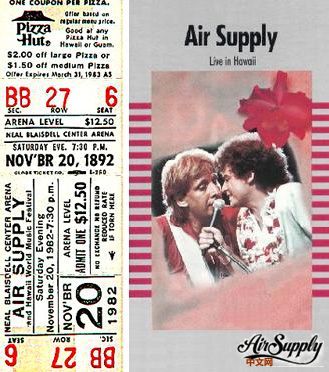
1982 Concert Stub & 1983 VHS
The tour of America wrapped up in Hawaii with a show at the Neil Blaisdell Arena in Honolulu on November 20. The concert was recorded for an HBO TV special that aired on January 23, 1983, with Don Arden as the executive producer. Surprisingly, Air Supply did not include their two latest American singles in the live show, but did perform an upbeat song called ‘Late Again.’ In November, it was released as a single in Australia, and was included as an exclusive track on the Australian album ‘Now And Forever.’
HBO aired the Hawaii concert again in 1984, plus it was released to retail ($29.95) in November on VHS, Beta, and LaserDisc and was a popular rental. North American video stores in the 80s tended to stock few Beta videos, so even non-Air Supply fans with Beta machines were more likely to rent Live in Hawaii based simply on limited options, and become fans through watching.
Air Supply in Hawaii was released on video for two purposes: to please old fans and to gain new ones. The concert featured plenty of the old favourites that made Air Supply so popular, but also a few harder rock tunes carefully selected and placed at the beginning of the tape to shock and capture rock fans. The video begins with a breathtaking laser show and well-chosen soft lighting to enhance the concert footage without distracting the viewer form what Russell says is important to get across: the message of the music. There was limited editing and post production work on Air Supply in Hawaii, and a few mistakes made it to video. “I’ve seen the video three or four times,” said Russell, “and I’ve thought, ‘Oops, the vocals are off key.’ But that’s what we wanted people to see - us, really live. People had only heard us on records that were really slick with everything just perfect. We wanted them to see how an audience responds to us in a live situation and that we are capable of filling a place with a helluva lot of enthusiasm. People have not seen us. Because of the material we’ve released up to this point, we’ve been given this non-image. The video cassette is a great opportunity for us to broaden our audience and show people that we are capable of greatness in concert. And I think we are. I’m sure that people who accidentally saw the original production that was on HBO were pleasantly surprised.” |
|